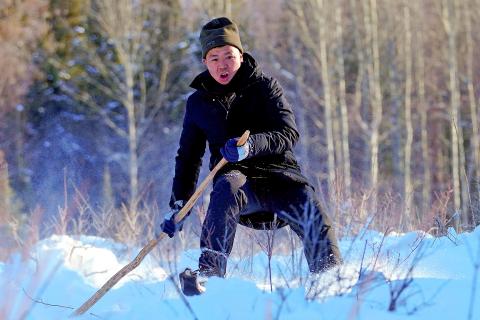On the western edge of China, Sulita straps on his skis and heads out into a winter morning.
The temperature is minus-30?C.
For much of the year, skiing is the only way to get around Khom, a village of wooden cabins heated by earthen stoves, five hours’ drive from the nearest major town in the northern Altay region of Xinjiang.

Photo: Reuters
The design of skis such as the ones used by Sulita, who like many people in the region uses just one name, have barely changed for centuries.
The bottom of the skis are covered with horsehide and the shoes are tied on with leather rope.
The direction of the horse fur allows the skis to slide forward, while preventing them from slipping backward when traveling uphill.
“I’ve been up the highest mountains with these,” Sulita said. “When I was young, we used the horsehide skis a lot, for hunting or if we lost a cow or sheep.”
Xinjiang is a volatile region where hundreds of people have been killed in in violence between Uighurs, a mostly Muslim people, and ethnic majority Han Chinese, which Beijing blames on militants.
Most of the violence has been in the far south of the region, rather than its far north.
Cave paintings discovered in Altay — today home to a mixture of ethnic Tuvans and Kazakhs — show rows of figures standing on what look like skis, with herds of animals running below them.
Archeologists have dated the paintings as 10,000 to 30,000 years old, according to Chinese ski historian Shan Zhaojian (單兆鑒).
That would date them as much older than archeological findings of skiing in Russia, cited by the International Ski Federation, the sport’s governing body, as coming from 6,300 to 5,000 BC.
“It’s the earliest in the world that’s for sure,” Shan said. “I’ve got a total of 10 pieces of evidence that can prove this.”
China is keen to cash in on this historical connection.
The nation is to host the 2022 Winter Olympics in Beijing and wants 300 million Chinese involved in winter sports before then.
With Shan’s help, the Xinjiang government has organized races using traditional skis and recognizes skiing as a cultural heritage.
Still, the practice is slowly dying out.
Forty minutes outside Altay city, the regional capital, Slanbek still makes skis, but today they are just for show.
“You can’t hunt anymore, you can’t cut down trees, so there’s not much use for them,” he said, referring to official bans on both practices.
Instead, much of Altay has embraced modern skiing.
At the General’s Mountain resort, Mongolian folk-metal and Adele blast out over loudspeakers as children as young as five zip down the slopes.
Its abundant snow and mountains make this region one of the best places for skiing in the nation and instructors hope some of the children training might become Olympians.
Whether the use of horsehide skis survives depends on the younger generation in the remote villages around Khom.
As the sun peeks over the mountains into valleys around Khom, Namujel, 13, races his horsehide skis against his neighbor and friend, Mieergenku, 12, who is using modern skis.
There is no competition, Mieergenku zooms past, the clear winner, but for Namujel it does not matter.
“We can’t just give up on the horsehair skis, we have to pass them on to the next generation,” he said.

The collapse of the Swiss Birch glacier serves as a chilling warning of the escalating dangers faced by communities worldwide living under the shadow of fragile ice, particularly in Asia, experts said. Footage of the collapse on Wednesday showed a huge cloud of ice and rubble hurtling down the mountainside into the hamlet of Blatten. Swiss Development Cooperation disaster risk reduction adviser Ali Neumann said that while the role of climate change in the case of Blatten “still needs to be investigated,” the wider impacts were clear on the cryosphere — the part of the world covered by frozen water. “Climate change and

Poland is set to hold a presidential runoff election today between two candidates offering starkly different visions for the country’s future. The winner would succeed Polish President Andrzej Duda, a conservative who is finishing his second and final term. The outcome would determine whether Poland embraces a nationalist populist trajectory or pivots more fully toward liberal, pro-European policies. An exit poll by Ipsos would be released when polls close today at 9pm local time, with a margin of error of plus or minus 2 percentage points. Final results are expected tomorrow. Whoever wins can be expected to either help or hinder the

DENIAL: Musk said that the ‘New York Times was lying their ass off,’ after it reported he used so much drugs that he developed bladder problems Elon Musk on Saturday denied a report that he used ketamine and other drugs extensively last year on the US presidential campaign trail. The New York Times on Friday reported that the billionaire adviser to US President Donald Trump used so much ketamine, a powerful anesthetic, that he developed bladder problems. The newspaper said the world’s richest person also took ecstasy and mushrooms, and traveled with a pill box last year, adding that it was not known whether Musk also took drugs while heading the so-called US Department of Government Efficiency (DOGE) after Trump took power in January. In a

It turns out that looming collision between our Milky Way and Andromeda galaxies might not happen after all. Astronomers on Monday said that the probability of the two spiral galaxies colliding is less than previously thought, with a 50-50 chance within the next 10 billion years. That is essentially a coin flip, but still better odds than previous estimates and farther out in time. “As it stands, proclamations of the impending demise of our galaxy seem greatly exaggerated,” the Finnish-led team wrote in a study appearing in Nature Astronomy. While good news for the Milky Way galaxy, the latest forecast might be moot